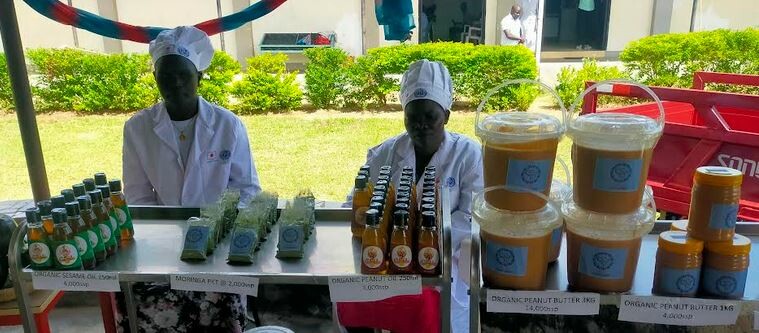The beneficiaries of several projects supported by the Government of Japan through their embassy in South Sudan say their livelihoods have been greatly improved and that they can now feed their families and meet basic needs.
Esther Sukeji, 20, a secondary school leaver who bakes cakes and biscuits among other confectionaries at Don Bosco in the Gumbo suburb of Juba, says that through the Japanese-supported project, the knowledge she acquired has helped her meet her basic needs and save money to go back to school.
“I have worked here for eight months and I learned a lot including to bake biscuits, queen cakes, and birthday cakes and make samosa,” she says. “This has helped me so much because I completed secondary school and now work here and I have been able to save money so that next year I can go back to school. The money I earn here also helps me support my family.”
“I thank the Government of Japan for coming up with this initiative because, with this knowledge, I can go to another place, work, and earn money,” Sukeji adds.
The Japanese-funded Women Empowerment Project at Don Bosco Center supports 80 women including IDPs from Eastern Equatoria and host communities to ensure food security and peace consolidation through training women and providing equipment.
The center has several activities including, catering, agriculture, tailoring, and a processing department in which a local non-governmental organization, Universal Intervention and Development Organization (UNIDO), is supporting the women with training on Village Savings and Loans Associations, oil processing, making peanut butter and training in food safety.
Mary Paul, 52, a mother of four and a beneficiary of one of the the Village Savings and Loan Associations (VSLA), said she has been a beneficiary of the Japanese-sponsored project since 2019 and has been able to meet their daily needs, pay school fees and build a house.
“I joined in 2019 and we started saving and we have continued doing it. My savings have helped me pay my children’s school fees and treat them when they fall sick,” she explains. “We formed a group of 28 people with everyone contributing SSP 3,000. Out of this, 2,500 is savings and the SSP 500 is pooled in a social fund which is given out as loans that are paid with interest. This program has improved my life and I have been able to build a house.”
Mary urged the Government of Japan to train more women in the culture of savings so that they become self-reliant.
“I want to appeal to the Japanese not to leave but rather train more women about village savings,” she urged.
For her part, Yomon Jocelyn, the National Project Coordinator at UNIDOR, appreciated the project but said it faces the challenge of lack of stable electricity supply and asked the Japanese government to install solar power so that the center runs smoothly.
“I would want to give thanks to the Japanese for supporting these women. One of the challenges that these women face is electricity, the power for processing because it is very expensive,” she highlighted. “We hope that the Japanese people can still support them to install clean energy, solar energy so that they can process their products. Everything depends on electricity.”
Meanwhile, Tsutsumi Naohiro, the Japan Ambassador to South Sudan, said Japan’s assistance is not to just give food or shelter to the needy but to make people independent through self-reliance.
He said Japan’s Official Development Assistance (ODA) provides South Sudanese people with tools for pursuing such self-reliant economic development so that they can produce agricultural and industrial products, trade them, make a profit, and feed their families. He noted that the financial resources of Japan’s ODA come from Japanese taxpayers who work hard every day and pay taxes.
“Japan’s assistance to South Sudan should not only be beneficial to South Sudanese but also deserving or rewarding to Japanese taxpayers who support the ODA given to South Sudan. Otherwise, such assistance cannot be sustainable” he states.
Another project supported by the Government of Japan is the construction of four new bridges in Juba City.
During a recent media tour of the Albino Bridge last week, a Japanese engineer at the site said they started construction on 6 December 2022 and that the project implementation is progressing as planned.
“We will complete and hand over this bridge next February. We refer to this Albino Bridge as bridge number four and now we are casting concrete. This bridge includes an approach road of 200 meters. We are also working on two bridges at Shuhada near the University of Juba and next year we will start Kokora Bridge next to Freedom Hospital,” he explained. “The progress for this bridge is on schedule but the other bridge is a little bit behind schedule. One of the challenges we are facing is the water, when the stream fills up with too much water, it slows our work.”
The project administrator at the Albino Bridge, Emmanuel Yugu, says the project has employed 120 South Sudanese nationals and that South Sudanese engineers work together with their Japanese counterparts.
“The Japanese have a heart of supporting South Sudanese to learn new things and do not hide their skills from us,” he states. “I want to appeal to the Japanese to train South Sudanese and also take some of our people for intensive training in Japan.”
The Government of Japan, through the Japanese International Cooperation Agency (JICA), has contributed USD 700 million to South Sudan since its independence in 2011.
Some of the mega projects funded or implemented by the Japanese include the Freedom Bridge, the Juba River Port, the construction of the Juba Water Supply System, and the improvement of solid waste management among others.




